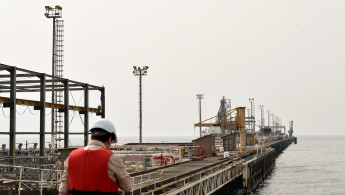Iran says selling oil through 'unconventional' means
"We have unofficial or unconventional sales, all of which are secret, because if they are made known America would immediately stop them," he said, quoted by the oil ministry's SHANA news agency.
Zanganeh declined to give details on Iran's oil exports, saying he would not disclose figures until sanctions were lifted.
In May 2018, Washington withdrew from Iran's 2015 nuclear deal with world powers that granted Tehran sanctions relief in exchange for curbs on its atomic programme.
Washington reimposed oil sanctions on Iran last November, but initially gave eight countries, including several allies such as China, six-month waivers.
Iran's oil shipments tumbled to 750,000 barrels per day in April compared to 1.5 million in October, according to data compiled by Bloomberg.
The White House in May ended all the waivers as part of a "maximum pressure" campaign against Tehran.
According to Zanganeh, the US has reached an "evil maturity" in tightening the noose on Iran's economy using "smart sanctions".
"The most severe organised sanctions in history are currently being imposed on Iran," he said.
On Friday, the Trump administration imposed sanctions on Iran's largest and most profitable petrochemicals group, PGPIC, for allegedly doing business with the paramilitary Revolutionary Guard. The White House branded the Revolutionary Guard a terrorist organisation in April.
Iran condemned Friday’s sanctions, saying they prove President Donald Trump is not serious about pursuing negotiations.
Foreign Ministry spokesman Abbas Mousavi was quoted by state TV on Saturday as saying the move amounts to "economic terrorism" and is in line with other hostile American policies.
"Only one week was needed for the US president's claim that he was ready to negotiate with Iran to be proven hollow," Mousavi said.
Meanwhile, Iran on Friday rejected a suggestion made by France to re-open talks on the country's nuclear programme, following the crippling US sanctions on Tehran and rising tensions in the Gulf region.
Mousavi warned that "bringing up issues that are beyond the JCPOA [nuclear deal] does not help in saving the JCPOA, but will instead cause increased distrust among the remaining parties" to the deal.
In a statement on Iran's foreign ministry's website, Mousavi said that European countries that had were party to the nuclear deal had been "incapable of acting upon their commitments".
He added that making new deals would "only help America in nearing its objective - the collapse of the JCPOA [nuclear agreement]".
European allies of the US are also angered by President Donald Trump's decision last year to cancel the landmark nuclear agreement between Iran and world powers and have been eager to keep the deal alive.
Trump's administration said the decision was based on Iran's ballistics missile programme and regional expansionism.
President Emmanuel Macron said on Thursday that his goal of "regional peace" would require new negotiations, saying that France also intended to rein in Iran's nuclear and ballistics activities and its regional influence.
The JCPOA was an agreement between world powers - including France and the US - that gave Iran sanctions relief in return for curbs on its nuclear programme.
Despite Trump pulling the US out of the deal, Iran had until recently remained in full compliance with the stipulations of the agreement. European and other powers have struggled to bypass US sanctions, meaning the deal is effectively dead.
Follow us on Twitter: @The_NewArab





 Follow the Middle East's top stories in English at The New Arab on Google News
Follow the Middle East's top stories in English at The New Arab on Google News

![Israeli forces ordered bombed Gaza's Jabalia, ordering residents to leave [Getty]](/sites/default/files/styles/image_330x185/public/2176418030.jpeg?h=a5f2f23a&itok=_YGZaP1z)
